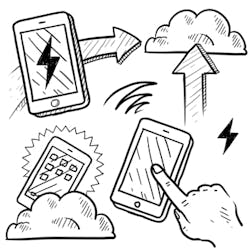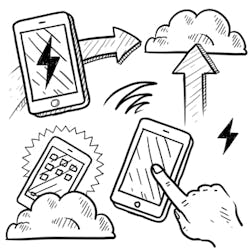Data storage and dental health care
Losing data is something that no dentist wants to go through. The process of recovering important information such as patient records, insurance claims, and invoices from damaged machines can be taxing, and in some cases impossible.
Before Superstorm Sandy, many businesses, including dental practices, were operating without a data backup plan. As a result, Business Wire found that 43% of these businesses had to close their doors due to loss of data and revenue. Many of these businesses were caught off guard by the storm, and unfortunately 46% of them are still operating without a sufficient data recovery option.
Many new dental practices are paperless and use methods such as cloud or hard-drive storage to store their data. These methods also work as retrieval options in case of disaster or technical failure. Older practices that keep paper records may be lulled into a false sense of security. Many believe that they can save their paperwork in the case of a disaster. However, like most disasters, they happen unexpectedly, so this isn’t a sufficient safeguard against data loss. To protect your practice against the risks due to data loss, look into tried and true disaster recovery options.
READ:One year after Hurricane Sandy: How one dental office survived
Disaster recovery
Before getting into the methods of retrieval, it’s important to understand a few things about disaster recovery.
First, disaster recovery can work for any dental practice, no matter the size or location. Even if your practice is in an area that doesn’t have many storms or grid failures, fires, floods and break-ins are still legitimate reasons to protect your data. For the sake of protecting your practice from these risks, data storage off-site is best.
Second, business insurance that protects against revenue loss due to premise or equipment damage won’t always cover data loss; that is usually a secondary type of coverage. If your equipment or office suffers any damage from a storm or technical problem, you can make a claim for loss of wages, but this protection is temporary. Make sure you check your insurance policies ahead of time to see what’s covered and what’s not.
Last, disaster recovery will work to your advantage only if you check on your data frequently. Even if you decide to store your data off-site or in the cloud, it’s always wise to check on your data every now and again. If you’re using cloud storage or you’re storing your data on a hard-drive, the American Dental Association suggests backing up your data each day to prevent irreversible loss. Cloud storage may offer auto backups, but if your office equipment becomes damaged before a backup is scheduled, you will lose that data.
Methods of recovery
The great thing about using external backup methods is that there are several methods you can use to recover your data.
- Hard drive — Data saved on a hard drive can be recovered using special computer software programs. These programs are designed to bypass failures, but in some instances it may be necessary to take it to a professional. If your device doesn’t power up or you don’t have access to a computer, a professional technician can recover it. However, if the device is damaged it may not be possible.
- Memory sticks and SD cards — You can retrieve your data from these devices by connecting them to another PC. However, these devices may fail if they’re abruptly removed from the computer they were in. If they fail, technicians can run special hardware that enables them to recover the data. You have to constantly back up your data to these storage devices to retrieve the latest info.
Once you determine what method of storage and recovery is best for your dental practice, add it to your continuity plan. Make sure your senior staff is aware of these changes so they’re able to access the information in case of an emergency. Dentistry is a lucrative field, but the potential losses a practice can suffer in a disaster are unfathomable. Smart disaster recovery planning means planning ahead of time, not when disaster strikes.
-----------------------------------------------------
RELATED ARTICLE:
DDS Rescue data recovery solution
The economics of the Cloud: A different perspective
------------------------------------------------------
Additional info
If you don’t want the hassle of finding a tech company to retrieve your data, you can use a cloud storage company.
Cloud storage refers to a storage option that is accessible only via Internet. A third-party host provides your dental practice with a HIPPA safe storage option with as much storage capacity as you need. The service differs in price depending on what company you choose and what extras you need. Some of these cloud storage options are app-based, so you can use smart devices such as smartphones, tablets, or iPhones to access it. You can also use a cloud database to work from directly. This way if you lose power or Internet connection on site, you can retrieve the data from another location or from a smart device.
Anne Matthews is a professional blogger who enjoys writing about data recovery technologies and solutions. She currently writes blogs for CBL Data Recovery.

